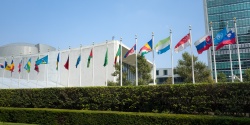Published: 01.09.2022

· Negotiations on the UN resolution "Access to justice for victims of sexual violence" are coming to an end.
· It aims to promote the so-called safe abortion as a human right to "ensure the promotion and protection of the human rights of all women and their sexual and reproductive health".
· The resolution disregards the legislation of many UN member states whose laws protect human life in the womb, including Polish law.
· Approval of the document would reverse the outcome of the Cairo Conference, which left the decision on the matter to individual states.
· If adopted, the UN General Assembly will pledge its support to legalize access to "safe abortion" in countries around the world and call on governments to "ensure sexual and reproductive health" as a means to combat violence against women.
· The Ordo Iuris Institute prepared a letter to the President of the Republic of Poland and the Polish delegation to the United Nations with an appeal to express their objection to the approval of the resolution.
The motion for a resolution "International cooperation in access to justice, remedies and assistance for survivors of sexual violence", aimed at strengthening and protecting the international response to violence against women and girls, is to be adopted by the UN General Assembly on September 2, 2022. that Member States have a duty to promote, protect and respect "health services, including sexual and reproductive health and other support services" as a response to sexual violence against women. The authors of the document even go so far as to explicitly call on states to guarantee abortion as a right. In addition, the resolution contains numerous references to "gender-based violence", as understood in line with an internationally accepted open definition that includes "sexual orientation and gender identity".
The resolution calls for the promotion of abortion also in those countries where the recognition of such a right would be contrary to national legislation, due to the fact that it is allowed only as an exception to the generally accepted principle of the protection of life. Importantly, the concept of "safe abortion" has not been defined or agreed at the international level. The UN has so far considered abortion a highly debatable issue that should be decided at the national level. In this respect, the content of the resolution contradicts the findings of the 1994 Population Conference. in Cairo, which stipulate (paragraph 8.25) that abortion may not be promoted as a method of family planning. Moreover, according to the conference, governments should help women avoid abortion, and international agencies should not interfere with national abortion policy, because it is the sole responsibility of sovereign states.
Non-governmental organizations observing the ongoing negotiations in the United Nations drew attention to the silencing of opposing voices. The Japanese diplomat in the negotiation firmly stated that delegations cannot change the language on abortion. Domestic observers also noted the aggressive negotiations conducted by the European Union, which is among the main authors of the resolution.
In connection with the resolute attempt to force the resolution to be approved by the General Assembly, the Ordo Iuris Institute prepared a letter addressed to the President of the Republic of Poland and Poland's permanent representation in the United Nations, asking for a strong opposition to the approval of the resolutions that expressed their objection to the document.

19.05.2025
• The 78th World Health Assembly, the deliberative body of the World Health Organization, begins today in Geneva.

During Holy Week, when we remembered the martyrdom of Jesus, many Poles heard about the innocent death of 9-month-old Felek (such an altered name was given to him by Gazeta Wyborcza journalists). Potassium chloride – a substance used to carry out death sentences – was injected into the heart of the boy who was due to be born any day.

• Gazeta Wyborcza published an article titled "Ordo Iuris Wants the Constitutional Court to Delete the Premise of Endangering a Woman’s Health. Prof.

17.04.2025
• The Ordo Iuris Institute has prepared an opinion for the UN as part of a thematic report on surrogacy and its impact on the rights of women and children.